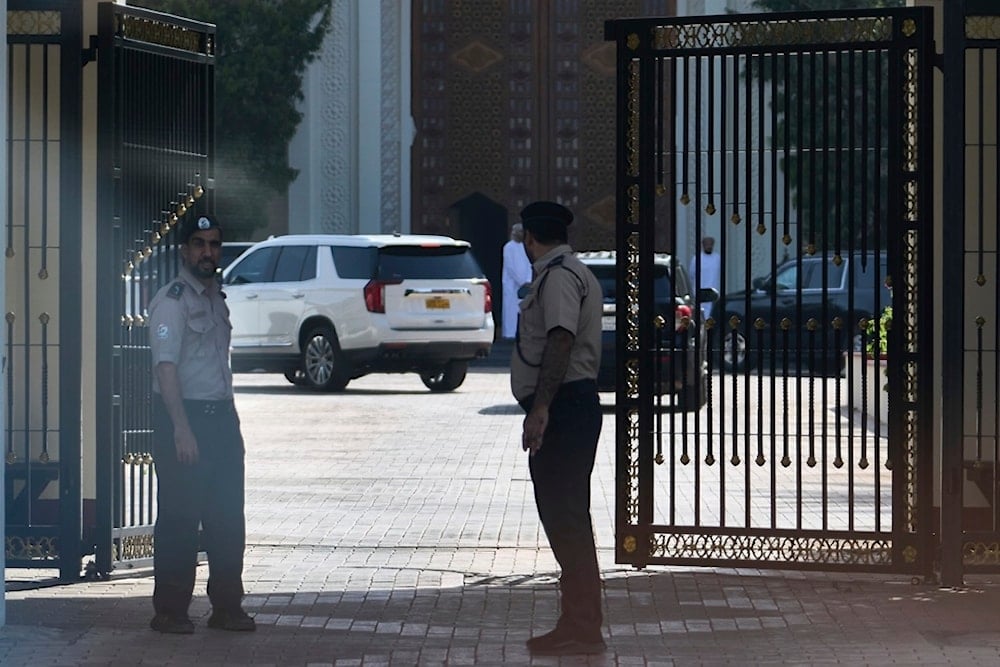US softens nuclear stance as Iran holds firm on red lines: WSJ
With the United States quietly walking back demands it once presented as non-negotiable, Iran enters this phase of diplomacy from a position of resilience.
-

Omani security personnel watch a convoy believed to be carrying US Mideast envoy Steve Witkoff in Muscat, Oman, Saturday, April 12, 2025 (AP Photo/Fatima Shbair)
The Wall Street Journal reported on Tuesday that the Trump administration is backing away from its initial demand that Iran fully dismantle its nuclear program, now indicating a willingness to accept low-level uranium enrichment under strict verification measures.
The shift, reported by journalist Michael Gordon, marks a significant concession and underscores how Washington's years-long strategy of sanctions and threats has failed to coerce Tehran into surrendering its sovereign nuclear rights.
US special envoy Steve Witkoff confirmed the administration's new position in an interview with Fox News: "They do not need to enrich past 3.67%. This is going to be much about verification on the enrichment program and then ultimately verification on weaponization." He added that oversight should also cover "missiles, the type of missiles that they have stockpiled there, and it includes the trigger for a bomb."
This admission comes as the US prepares for a new round of indirect negotiations with Iran in Oman, following what both sides called a "constructive" initial meeting last weekend. Despite the heightened rhetoric from President Donald Trump, who again threatened to strike Iran's nuclear facilities if talks fail, Iran has shown no indication of retreating from its core positions.
Tehran has long held that its nuclear program serves peaceful purposes, including electricity generation and medical research. Even as it enriches uranium up to 60%, Iranian officials maintain that the program remains civilian in nature. US intelligence agencies acknowledge that while Iran is technically capable of reaching weapons-grade levels within weeks, there is no evidence that the Iranian Leader, Ayatollah Ali Khamenei, has authorized weaponization.
Addressing the progress of the negotiations, Khamenei stated, "We are neither overly optimistic nor overly pessimistic about the talks," reflecting the Islamic Republic's strategic calm and confidence amid growing Western flexibility.
Nuclear Autonomy
The latest US proposal echoes some elements of the 2015 Joint Comprehensive Plan of Action (JCPOA), particularly the 3.67% enrichment cap. However, unlike the JCPOA, which allowed for the gradual lifting of restrictions, the Trump administration's current approach seeks a permanent limit—an idea Tehran considers both outdated and unrealistic, given its expanded nuclear infrastructure and enhanced regional standing.
Iran has made it unequivocally clear that it will not accept any negotiation that includes its missile arsenal or broader defense capabilities. As Foreign Ministry spokesperson Esmaeil Baqaei recently reiterated, "Iran will not have any talks with the American side on any other issue." This includes ballistic and cruise missile programs that Tehran views as integral to its national security and deterrence posture.
Despite calls from Israeli Prime Minister Benjamin Netanyahu for a "Libya model" of total nuclear disarmament under foreign oversight, the current trajectory suggests that such expectations are increasingly detached from reality. Israeli analyst Yoel Guzansky put it bluntly: "Israel can't live with Iran on the threshold, but the US can—that's the major difference."
Read more: Tehran rules out talks on US terms, says 'Libya-style deal a dream'
With the United States quietly walking back demands it once presented as non-negotiable, Iran enters this phase of diplomacy from a position of resilience. Years of economic siege, diplomatic pressure, and veiled military threats have failed to break its strategic resolve. Instead, Tehran has leveraged its scientific progress and regional alliances to shape a negotiation on its own terms—rooted not in capitulation, but in sovereignty, dignity, and unwavering national interest.

 4 Min Read
4 Min Read










